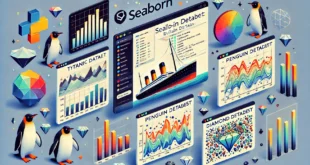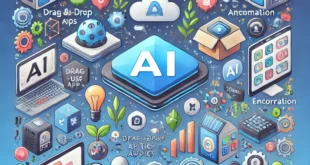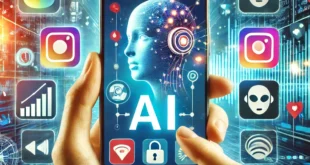Numerous areas of healthcare are utilizing AI, including medical administration, patient care, medication discovery, and diagnostics. Here are a few major domains where AI is already having a significant influence:
1. AI for Disease Prediction and Early Diagnosis
Treatment results can be greatly enhanced by detecting disorders early. Artificial intelligence is assisting in the earlier detection of diseases such as cancer, cardiovascular disease, and neurological disorders.
One example is the collaboration between Google’s DeepMind and the UK’s National Health Service (NHS) to create an AI system that can accurately identify more than 50 eye illnesses using retinal scans, on par with human doctors. Early detection of diabetic retinopathy and age-related macular degeneration, for example, would be possible with this method.
Deep learning for medical picture identification in radiological diagnostics: a research articleDocumentation of artificial intelligence’s role in cancer screenings and its incorporation into therapeutic decision-making: Research Paper
2. The Role of AI in Diagnostic Imaging and Medicine
The field of medical imaging is witnessing a paradigm shift due to AI. Algorithms powered by artificial intelligence, and notably deep learning models, can analyze intricate medical images with unparalleled precision.
As an example, PathAI has created AI-powered software that can evaluate pathology photos for indicators of cancer with the same degree of accuracy as human experts. This software is designed to assist pathologists in diagnosing diseases like cancer. The AI system outperformed pathologists in a real-world case by detecting prostate cancer with 98% accuracy.
Potential, Uses, and Dangers of Artificial Intelligence in Medical Imaging Article3. Tailored Treatment Programs
Through the analysis of multiple aspects, including genetics, lifestyle, and medical history, AI is enhancing the personalization of treatment for each patient. Treatment efficacy and side effect burden are both being lifted by the current trend toward individualized therapy.
Watson Health by IBM, for instance, analyzes medical data and suggests individual treatment programs for cancer patients based on artificial intelligence. Watson can determine the best treatments for each patient by analyzing their unique traits and conditions through an analysis of millions of medical records and scientific articles.
Personalized cancer treatment using AI-based precision medicine Paper4. Artificial Intelligence for Pharmaceutical R&D
Artificial intelligence (AI) is helping to speed up the process of finding successful medicines by modeling the interactions between pharmaceuticals and the human body and predicting how well they will work.
To illustrate how AI might be used to find new pharmacological substances for disorders like cancer and fibrosis, consider Insilico Medicine. Their AI technology quickly and accurately reduces the time needed for medication development by analyzing data from chemical and biological sources to generate novel therapeutic candidates that show promise.
AI for Medicinal Discovery: What is Real and What is Illusion?5. Virtual Health Assistants Driven by Artificial Intelligence
The way patients engage with healthcare services is being revolutionized by virtual assistants powered by artificial intelligence. A few examples of the services provided by these virtual assistants include appointment scheduling, prescription reminders, and access to basic medical records.
An AI-powered telemedicine platform called Babylon Health, for instance, provides virtual consultations with a chatbot that can identify typical medical conditions. With the assistance of natural language processing (NLP), the AI system can evaluate the patient’s symptom description and provide potential diagnoses.
Setting Up: Babylon Health’s chatbot is accessible through the company’s mobile app and has been incorporated into healthcare systems in many nations.
6. Using AI for Health Population Predictions and Analytics
In addition to these uses, AI is helping with disease outbreak prediction, healthcare resource management, and trend analysis in population health. Artificial intelligence (AI) can analyze massive databases to predict the development of epidemics, allowing healthcare professionals and governments to take preventative actions.
Using global health data, AI-powered platforms such as BlueDot could forecast where the COVID-19 pandemic will break out, for instance. Before official findings were available, the system could alert governments and health organizations about the possible threats.
The use of artificial intelligence for the prediction of the transmission of infectious diseases: a research paperConsiderations and Obstacles in the Application of Artificial Intelligence in Healthcare
Even though AI has a lot of promise in healthcare, there are still a number of obstacles that must be overcome:
- Ensuring the Security of Your Data: Artificial intelligence systems handling healthcare data must adhere to stringent standards like HIPAA in the US and GDPR in Europe due to the sensitive nature of the data involved. Data privacy is essential for keeping patients’ confidence and protecting their personal information.
- Problems with AI Models’ Impartiality: Machine learning models are only as accurate as the information used to train them. Artificial intelligence systems run the risk of making unfair treatment suggestions or incorrect forecasts if the data is skewed or missing key details.
- Evaluation by Regulators: Clinical use of AI-based healthcare solutions is contingent upon their passing extensive testing and gaining regulatory clearance. For the sake of patient safety, strict regulation is necessary for the incorporation of AI into healthcare systems.
- Using Current System Integration: The incorporation of new technology into preexisting healthcare infrastructure is essential for the implementation of AI in healthcare. Although this may be time-consuming and expensive, it is necessary to ensure that patients and healthcare providers have a smooth experience.
A Look Into AI’s Potential in the Medical Field
Artificial intelligence has tremendous potential in the medical field. It is highly probable that AI technologies will become even more ingrained in everyday healthcare procedures as they advance. Better virtual assistants, quicker drug development, more precise diagnostic technologies, and more individualized therapy alternatives are on the horizon.
Healthcare will become much more accessible, efficient, and effective in the next years thanks to AI. Healthcare systems can tackle important issues like lowering costs and improving patient outcomes by utilizing AI.
For further reading, check out these research papers and articles:
 AI Generated Apps AI Code Learning Technology
AI Generated Apps AI Code Learning Technology



